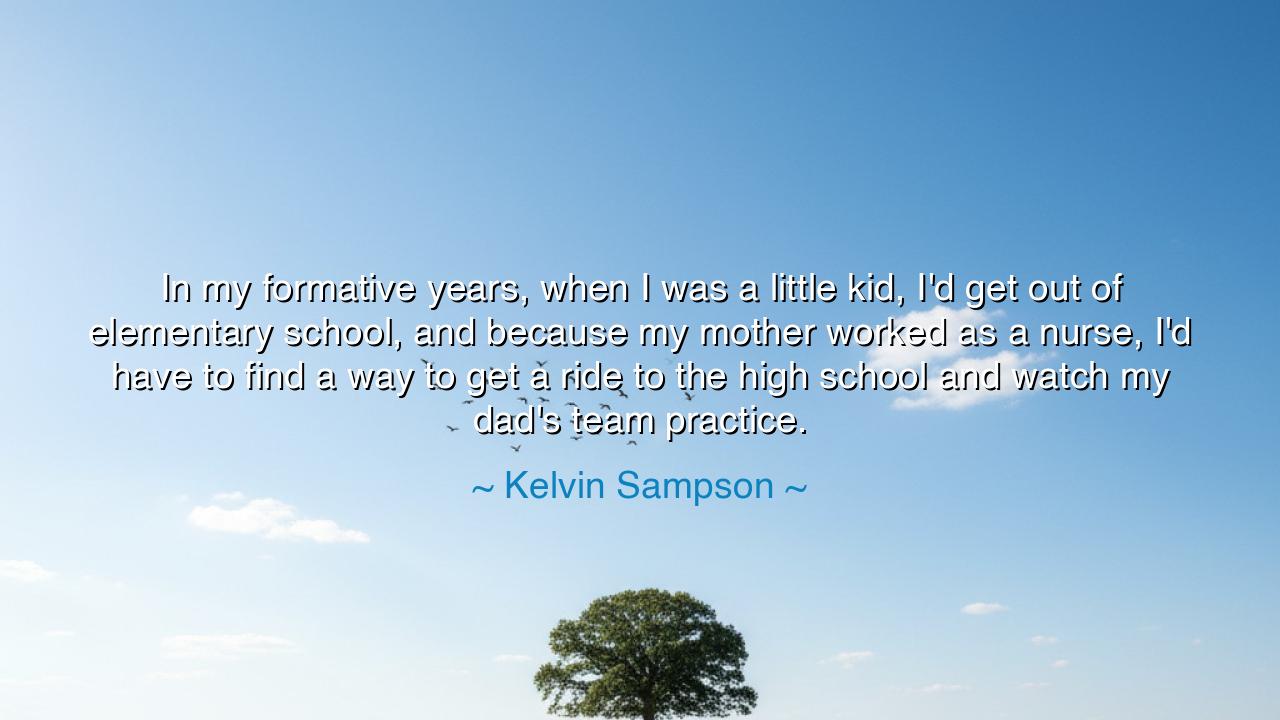
In my formative years, when I was a little kid, I'd get out of
In my formative years, when I was a little kid, I'd get out of elementary school, and because my mother worked as a nurse, I'd have to find a way to get a ride to the high school and watch my dad's team practice.






“In my formative years, when I was a little kid, I'd get out of elementary school, and because my mother worked as a nurse, I'd have to find a way to get a ride to the high school and watch my dad's team practice.” — Kelvin Sampson
Thus spoke Kelvin Sampson, the master of the court, the teacher of discipline and spirit, recalling the humble beginnings that shaped his destiny. In these simple words, he reveals a childhood molded not by luxury, but by devotion, observation, and family sacrifice. His memory is not one of grandeur, but of formation — those quiet years when character is carved, when the lessons of greatness are learned not in classrooms, but in life. He speaks of a boy waiting after school, finding his own way to the gym, drawn not by command but by love — love for his father, for the game, and for the world of purpose that surrounded them.
The origin of this quote lies in Sampson’s early life in North Carolina, long before he became one of the most respected coaches in college basketball. His father, John "Ned" Sampson, was a high school basketball coach and teacher — a man who believed not only in victory, but in the building of young men through discipline and example. His mother, a nurse, embodied compassion and endurance, working long hours to sustain the family. And so, the young Kelvin, caught between the healing touch of his mother and the teaching spirit of his father, grew up in an atmosphere of labor, humility, and purpose.
When he says, “I’d have to find a way to get a ride to the high school and watch my dad’s team practice,” he speaks not merely of transportation, but of determination — the hunger of a child who seeks not entertainment, but inspiration. In the echoing gymnasium, he would sit and watch — watch his father guide, correct, encourage, and sometimes scold. He learned that leadership is not about shouting orders, but about teaching with patience; that excellence is not born in applause, but in repetition, sweat, and humility. These practices were not merely games — they were rituals of growth, and in their rhythm, the boy found his calling.
The ancients, too, knew this path of formation through apprenticeship. Consider Alexander the Great, who as a child sat at the feet of Aristotle, watching and learning, absorbing the lessons that would one day guide empires. Or think of Leonardo da Vinci, who as a boy in Florence observed his master Verrocchio, learning through sight before he ever held a brush of his own. Observation, in every age, is the first step toward mastery — and Kelvin Sampson, like them, began not by commanding, but by watching, listening, absorbing. His greatness was not inherited, but cultivated through attention and reverence.
In his recollection, we also hear the quiet echo of sacrifice — the nurse mother laboring through long shifts, the coach father giving his heart to the court, and the young son learning to navigate independence. It is a portrait of the American spirit, the kind that believes hard work and family values can shape a person’s destiny. Sampson does not speak of wealth, of ease, or of privilege; he speaks of gratitude — for the lessons born of effort and example. It is this grounding, this humble beginning, that gave him the strength to endure the storms of competition and the test of leadership that awaited him.
In truth, Sampson’s story mirrors that of many who have risen from modest roots to greatness. His journey reminds us that influence is often caught, not taught — that the greatest lessons come not from instruction, but from immersion in the lives of those who live with integrity. Watching his father coach, he learned how to lead; seeing his mother work tirelessly, he learned compassion and endurance. Together, these formed the foundation of his philosophy: that excellence requires both strength and empathy, both command and care.
Let this, then, be the lesson: greatness does not begin in the spotlight, but in the shadows of practice and patience. Do not despise your beginnings, no matter how small or quiet they may seem. Observe those who live with purpose; study the craft you love with reverence; honor the sacrifices of those who make your path possible. For, as Kelvin Sampson’s life teaches, the seeds of destiny are planted not in triumph, but in the daily act of showing up — of watching, learning, and preparing until your time comes to lead.
And so, my child of the future, remember these words when your own path feels distant or unseen. You, too, are in your formative years, whether in youth or in spirit. Find your mentors, honor your teachers, and cherish those who labor quietly on your behalf. Watch the practice before you play the game. For the greatness you seek does not appear in an instant — it is built, one observation, one act of faith, and one humble day at a time.






AAdministratorAdministrator
Welcome, honored guests. Please leave a comment, we will respond soon